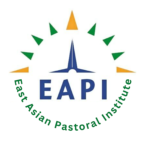Sr Maria Lancia Rodrigues PBVM ~ India
“We are instruments through which God’s grace needs to flow”
Sr Maria Lancia Rodrigues PBVM has been in the field of education for 25 years. She works among the marginalised tribes in very distant regions of India. A Presentation Sister for four decades now, she took the Sabbatical Renewal Experience programme at the East Asian Pastoral Institute. She is happy to return home with healing, zeal and learning.
“The journey to continue being instruments for God’s grace to flow is a meandering path through physical fatigue and rest, emotional blocks and spiritual seeking; it needs us to return our gaze back to the one who is always gazing at us…”
I had no expectations when I came to EAPI. I was just in need of some rest and solitude.
When I arrived at the reception, I saw a quote from Pope Francis which gave me some hope that this is a place where missionaries and pastoral workers can look for a space to reflect, discern, evaluate and claim more fervently the values of the crucified Lord and the Gospel. That filled me with a sense that God has brought me somewhere to unfold a wholesome dream for me.
In the EAPI dining room, there is a picture of Christ crucified gazing at the world that is also crucified. It became for me an invitation to welcome God’s gaze into the very human, broken, beautiful part of me during my entire time in EAPI. God is looking to me to accept the unconditionality of Sacred love and to grow with it, but it is also a gaze that looks at the whole world – the Rohingyas seeking shelter, the people in the war zones looking for peace and safety, the ones lost into human trafficking.
God’s compassionate gaze is everywhere and I grew to welcome that gaze on me and on our world knowing that we all have a role to play as a community. That is the kind of inspiration EAPI has for me.
It is also a place where the Asian, Pacific and African churches meet – a youthful and vibrant church. In one of our cultural events, the Samoans performed their age-old ritual for seeking forgiveness from people offended, in which the person who has been hurt is given an opportunity to understand, accept and grow towards forgiveness. I found the ritual of the Samoans so human, as the offended is given space and time to process, let go and genuinely forgive. The leader of the offender’s tribe shares the responsibility on behalf of the offender to seek forgiveness. The Samoans claimed that the ritual was in vogue long before Christianity was offered to the Samoans.
In EAPI I was impressed with the lay people who are very much empowered and have claimed the Ignatian charism from the Jesuits. Our eight-day retreat was directed/guided by a lay woman and a man. They both brought in a competence and a sensitivity into the whole experience of God and Spirituality which was joyful. The way they listened was so respectful, sensitive and the guidance so gentle and wholesome.
I often felt overwhelmed with EAPI’s respectful freedom and rich generosity. There was such a freedom experienced in daily living and a generosity in the way everything was served. There was never control to say only this much food or water or electricity. We were free to use resources. It was like God’s generosity that flowed to us. The experience of freedom and generosity drew me to reciprocate with cautious use of what was offered.
It was a generosity that extended even in the context of listening to different opinions, in listening to the voice of a woman when it came to making decisions. We were all heard, not just the leaders and important persons. The difference in opinion was not taken as a threat but was accepted respectfully and considered graciously in the decisions that were made.
There is much that the place can offer those who want to shake off the yoke from their shoulders and let rest, solitude, peace and God’s blessings come to them.
At EAPI, the Spirituality that was offered in modules enabled us to know God on a personal and inter-personal level, and in a human way. Often formative experiences train people to pray and be of service. It was obvious in the group that many of us were not trained to listen to human feelings and the body that often has a way of telling us to listen, understand, stop and rest.
One of the modules shared about the “wall”. It enabled us to be sensitive to the way God works with us in our lives. I sensed that service is one element of the Quest for God, but a deeper awareness of God’s presence and the stirrings within is also a way forward.
The journey to continue being instruments for God’s grace to flow is a meandering path through physical fatigue and rest, emotional blocks and spiritual seeking; it needs us to return our gaze back to the one who is always gazing at us, and welcome the graced elegance and beauty being offered to lead on, so that tiredness and hurt do not block the flow of God’s grace. That was a great insight for me. We need to grow beyond, to let God empower us into a journey of another kind of union with ourselves.
This article was posted on the Jesuit Conference of Asia Pacific (JCAP) website as part of a series of reflections from participants of EAPI’s residential programs, which run for four or six months.
